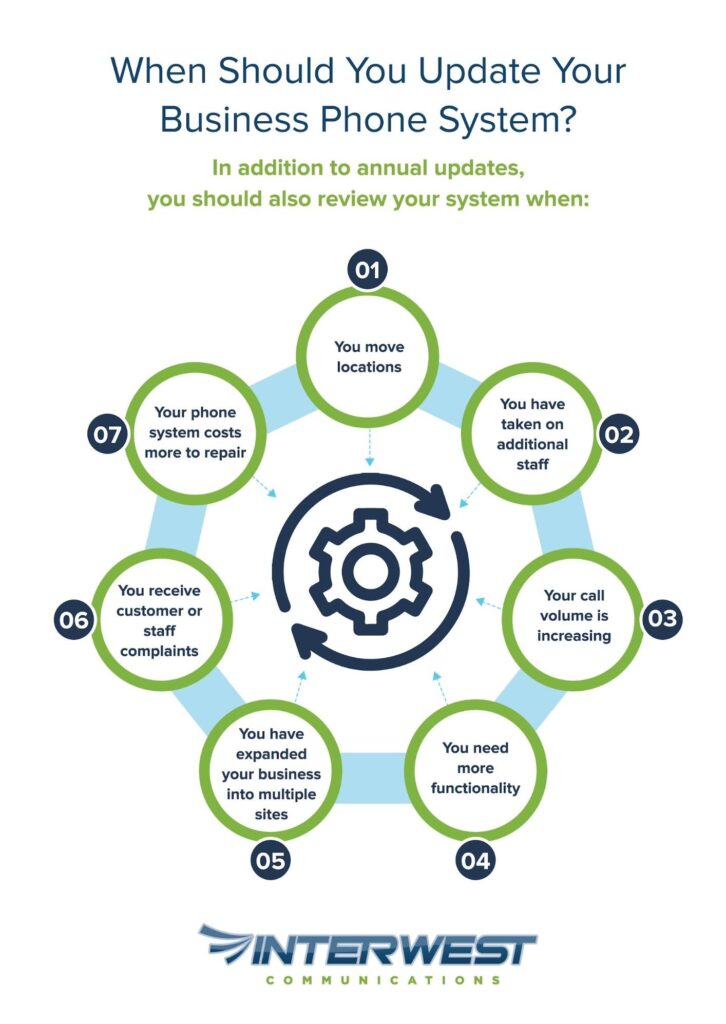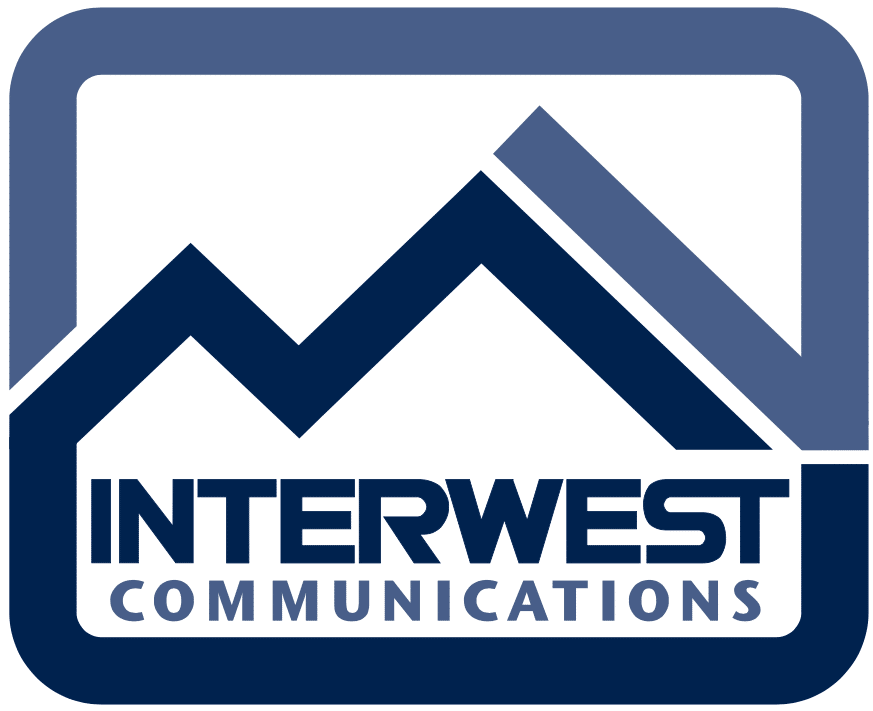- April 24, 2025
- Posted by: Interwest Communications Team
- Categories: News, Uncategorized

Originally posted on July 18, 2022 @ 10:51 pm

How Often Should You Update Your Phone System?
Even with the advent of the internet, phone systems are still a crucial part of any business. Technology is very fluid, and the systems keep updating. To get the best of the system, update to the most recent version available. Assess your phone system every year and upgrade to the new changes.
Why You Should Update Your Phone System Regularly
With an older system, you end up spending more on repairs. The system might also be more vulnerable to security risks, like hacking or breaches, opening you up to more liabilities and loss of reputation if customers sue your business.
When planning to scale your business, an outdated phone system should be the last thing in the way. Your business phone should have essential features that improve your business’ performance. If you fail to flow with the times, you’re exposing your business to unnecessary losses.
To determine if your phone system is failing you, you must ask yourself some critical questions. Sometimes, you might be pushed into a phone system review by several factors. Here are some of the signs you need to upgrade your current system.

When Should You Review Your Phone System?
One vital duty of business owners and IT staff is to recognize when to update their phone systems. If you have a quality control checklist in place, it becomes easy to spot these signs.
You should review your system often to ensure it is up-to-date. There are many times when you may be forced into reviewing your phone system needs.
- You move locations
- You have taken on additional staff
- Your call volume is increasing
- You need more functionality
- You have expanded your business into multiple sites
- You receive customer or staff complaints about the phone system
- Your phone system is technologically obsolete (repairs have become too expensive)
How Often Are Phone Systems Advancing?
Phone system technology has been evolving rapidly over the last ten years. Businesses running on older equipment are susceptible to security threats. Updating your phone system is one way to secure your business and position it for future expansion.
6 Signs That You Need to Upgrade Your System
Some obvious signs that you need to upgrade your phone system include the following:
1. Your Phone System Maintenance Costs Too Much
An older phone system has various hidden costs that might not be apparent at first glance. Keeping it running has costs like maintenance, proprietary hardware, licensing, and other expenses. The sum of these costs is known as TCO or Total Cost of Ownership, and you should consider it when upgrading your hardware. You might assume that TCO is a part of your business costs and even budget for it.
Most business owners do not consider how much money the upgrade will save them if they switch phone systems. More modern cloud-based tech is more straightforward in maintenance, saving you a lot of money. It is quite an investment up front, but the benefits outweigh the expense.
You get more productivity from the upgraded telephone system from the many more tasks a new system can do, such as unified communications (UC). It unifies the many communication methods in your business.
2. Your Phone System Can’t Keep Up With Your Business Expansion
Your business has expanded since you installed your phone system, which is good. If your company grows and the phone system stays the same, you might start stagnating your business. Be careful and note when you begin to peg your business decisions on your tools. If you are comfortable with the system and stick to it because of the comfort familiarity offers, you need a change.
If you need to add more business lines and the system cannot handle it, it’s time to upgrade! Modern cloud-based technology makes it easy to add new phone lines. You might justify sticking with the system in the short term, but over time, it becomes more of a liability. The system will end up stifling your business growth because it cannot accommodate the expansion.
3. Your Phone System Keeps Breaking Down
A phone system that keeps breaking down is a significant indicator you need to upgrade. The issue goes beyond the maintenance cost to include time wasted by employees. If the system requires constant repair, it means more downtime for your business and less productivity. You have to decide whether the old system is worth it or you are struggling to keep a sinking boat afloat.
4. Your Phone System’s Security Has Loopholes
In IBM and Ponemon Institute’s data breach report, a data breach in 2021 cost an average of $4.24 million. This is up from $3.86 million in 2019. This cost rises even higher in the healthcare sector. Data is crucial to business, and more companies fall prey to hacking. Information is a gold mine on the dark web, and hackers will always target a company that collects customer and employee data.
Using a familiar legacy system may seem harmless, but it opens your business to potential security risks. Every update in a technology seals security patches that make the system vulnerable. When you fail to upgrade, the cybercriminals use the known security patches to attack your system. A modern system integrates with your security plan and protects your data.
5. Your Reliability and Call Quality Keeps Declining
Update your system if your business keeps in touch with clients with the phone system or uses it to make telesales. The updated version ensures your reliability does not waver and the call quality remains clear.
It is disappointing for customers to call your business, and your line has poor call quality, or calls keep dropping. To work efficiently, upgrade to cloud-hosted VoIP for crisp quality calls and to ensure you keep your promises to clients. It’s unprofessional when your staff needs to call clients for appointments and your phone system is not working.
6. Your Phone System Can’t Support Remote Employees
Remote working became more prominent with the Covid lockdowns in 2020. According to a Gallup State of the American Workplace report, 62% of Americans worked remotely between Mid-march and the beginning of April. This percentage totaled almost 100 million Americans!
To support this trend, most companies have shifted to cloud-based tools. These tools ensure that employees can access the resources they need to work efficiently.
If your old phone system does not support cloud integration, remote work becomes almost impossible. An upgraded business phone system allows remote workers to access all office resources.
What Matters in a Business Phone System?
Communication with customers and partners is necessary for any business. A sound business phone system should meet your communication needs. So, what are the factors to consider when choosing a suitable business phone system?
1. Reliability
Phone systems are of various types. Select a reliable type, no matter what prompts your business phone system choices. Your ideal service provider should have 99.9% uptime. It’s unacceptable to pay for a service that isn’t available 24/7. Research how quickly the provider could restore service in an emergency downtime. That includes available data centers and call carriers that the provider partners with.
2. Security
You want to protect your business from cyberattacks or data breaches. Security is especially important to consider for remote work since it can create more opportunities for threats to enter the network. Choose a provider with data encryption services and secure physical data centers. Interwest can help you choose the security system for your business.
3. Speed
Your business phone system shouldn’t hold you back for any reason. Performance speed is one primary aspect to look out for when choosing a phone system. It should be able to handle incoming and outgoing calls at top speed, with no lag in video or call quality.
4. Costs
Phone system monthly subscription service prices vary per company and technology deployed. Standard landline systems cost about $60 to $80, while cloud-based systems go for $20 to $60.
If you’re choosing an on-premise VoIP system, be ready to pay around $2000, including the installation fee. VoIP systems that could support 1000 plus users cost around $300 to $15000 depending on the equipment. You may also have to consider the price of phones. Virtual phones are excellent if you’re on a budget.
5. Features
Features vary per phone system type and subscription plan. Do you need mobility, conference calls, and messaging features to support remote work capabilities? Or do you just need voicemail and call control?
6. Support
Get a service provider with 24/7 support regardless of having an in-house IT staff. It should also have multiple support channels. Also, read user feedback to know their speed of response.
7. Scalability
You want a flexible phone system that is easy to expand. Pick a phone system that allows you to add more lines and won’t cause problems during the upgrade.
7 Questions to Ask Yourself When Considering Updating Your Business Phone System
1. Are You Spending More on Phone Charges?
SIP connections are cheaper than PSTN lines. Upgrading your business phone system to a cloud-based system could help you save money.
2. Is Your Phone System Becoming Too Old?
Can your existing phone system support modern features like mobility and conference calls? If your phone system cannot support the latest communication features, then it’s time for an upgrade. Besides missing out on the latest features, your competition could be taking advantage of the improving technology.
3. Are You Experiencing Slow Business Growth with the Current Phone System?
Every business owner wants to grow and make a profit. That means your phone system shouldn’t be a hindrance. Your business phone system should be capable of handling incoming calls without missing them. Conversations with your caller should be smooth and the call volume loud. You need a system update if there are signs of struggles with volume or answering calls.
4. Is Your Business Phone System Compatible with Remote Working?
Remote working has become an inseparable part of the business world. Phone systems should support team members that work from home. You should consider upgrading your phone system if it fails to redirect calls from the employee’s office desk to phones or laptops at home.
5. How Well Can Your Phone System Protect Your Data?
Hanging on to obsolete systems could expose your network to security risks. Cybercriminals and hackers exploit security hitches in legacy systems. In turn, they gain access to valuable information and data. Installing a new phone system is one of the ways to protect your network from cyberattacks.
6. Can Your Phone System Support a Multi-location Feature?
As your business expands, you’ll need to set up different phone administration centers. Setting up these phone line points should not be a big task. Hence, it would help if you upgraded to a system that can streamline communication across different locations without the risk of data loss.
7. Can Your Current Phone System Manage Disaster?
Emergencies and unplanned events occur every day. But your business should not suffer due to a system failure. Whatever happens, you should still take customer calls. Besides integrating quick recovery plans, modern phone systems enable call routing to keep your business functioning. Updating your system is crucial to maintaining system processes during emergency downtime.
5 Tips to Ensure You Have a Successful Phone System Upgrade
Here are items to keep in mind when updating your business phone system:
- Create a backup plan – It takes a lot of effort to update some phone systems. VoIP installation can develop issues if the internet goes down before the upgrade completes. Having a backup plan could save you a lot of trouble.
- Call volume – Consider the number of calls your system gets daily. A lower call volume could negatively affect your system’s operations. Choose a host phone system if you must synchronize systems from multiple locations.
- Relevant features – Be sure to know what phone system features you need and the cost. Know the cost of maintaining this new system.
- Conference calls – If your business thrives on conference calls, select a system that can handle it.
- Emergency recovery – Research what to expect from your phone system during emergencies. Know how quickly the system recovers to help you prepare for downtime.
Interwest Can Help You Upgrade
Keeping up with technological trends can boost your business productivity. If you know your system is about 5 to 10 years old or the call volume has increased, it’s time to consider a system update. Regular review of your business phone system is crucial for your organization’s smooth operation.
Need help with your business phone system upgrade and installation? Interwest Communication Technicians are available 24/7 to help. Contact us today!
